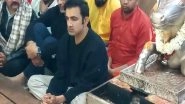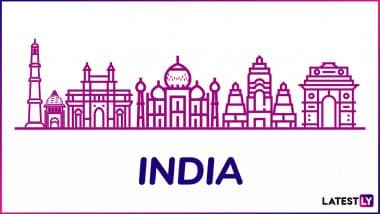Kolkata, Nov 20 (PTI) Completion of the East-West Metro corridor is likely to be delayed by up to one year due to the accident caused by an aquifer burst in Bowbazar area during drilling operations in August, a senior KMRC official said.
The 16.6-km-long rapid transit system, connecting the twin cities of Kolkata and Howrah, may now be completed by mid-2022, he said.
"The project was scheduled to be completed by June 2021, but we are apprehending that it may get delayed by approximately six months to one year," the Kolkata Metro Railway Corporation (KMRC) official said.
Technical experts are working on a roadmap for resumption of work on the Bowbazar stretch, he said.
"Our priority is restoration work in the affected area. An expert team is working on the resumption of tunnel boring work at the site," he told PTI.
The official said that there was no plan to change the route of the East-West Metro due to the accident since only one km of tunnelling work was left to be completed.
He said that the KMRC authorites were expecting to finalise a plan to restart work for the rest of the tunnel "very soon."
Several buildings at Durga Pituri Lane and Syakra Para Lane in Bowbazar area of central Kolkata had collapsed or developed cracks owing to the accident on August 31, when an aquifer broke during tunnel boring and water and silt gushed in, leading to severe ground subsidence in the vicinity.
Tunnel boring for the East-West Metro corridor was stopped following the accident and would restart only after the Calcutta High Court gave its nod, the KMRC told a division bench presided by Chief Justice T B N Radhakrishnan in early September in connection with a PIL against tunnelling work in the congested area of the city.
The court had then ordered suspension of the tunnelling work for the East-West Metro corridor.
A crisis management team was formed by the KMRC, which is executing the East-West Metro project, under the leadership of Leonard John Endicott, a geotechnical expert from Hong Kong.
Other members in the committee include Guy David Christopher Bridges, a tunnel boring machine expert from Hong Kong, Neelakantan Kumar Pitchumani, a geotechnical expert from Chennai, and Suman Dutta, a structural expert from Kolkata.
The high court has earlier this week allowed the KMRC to move the unaffected tunnel boring machine (TBM) up to five metres for maintenance work.
The KMRC has told the court that work for 9.8 km of the 10.9-km-long underground tunnel has been completed for the metro corridor.
Tunnels have been bored under the Hooghly river to connect the twin cities of Kolkata and Howrah through the rapid transit system, spanning a length of 16.6 km from Howrah Maidan to IT hub Sector V in Salt Lake.
The new corridor passes through some of Kolkata's most-congested areas, dotted by century-old buildings, several of which are in a dilapidated condition.
(The above story is verified and authored by Press Trust of India (PTI) staff. PTI, India’s premier news agency, employs more than 400 journalists and 500 stringers to cover almost every district and small town in India.. The views appearing in the above post do not reflect the opinions of LatestLY)













 Quickly
Quickly


